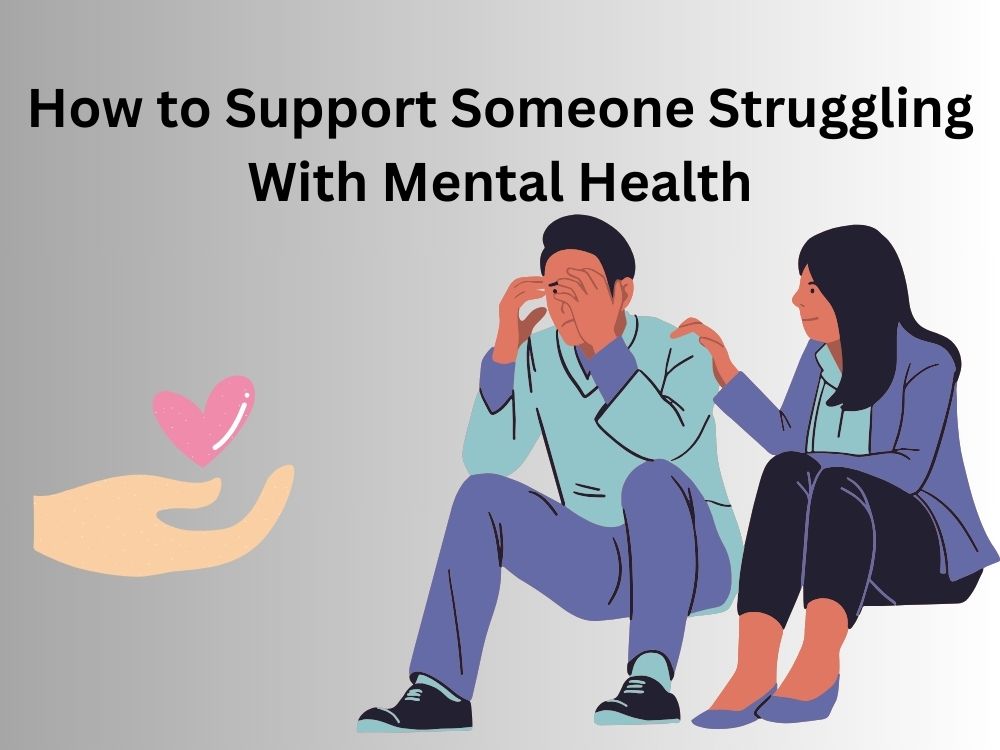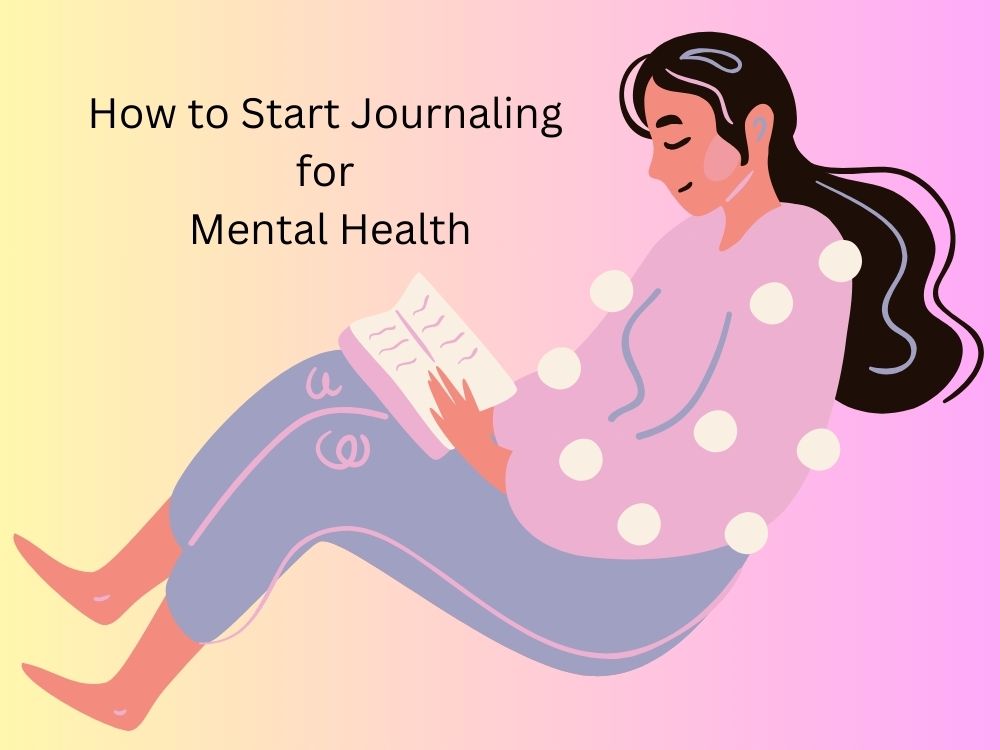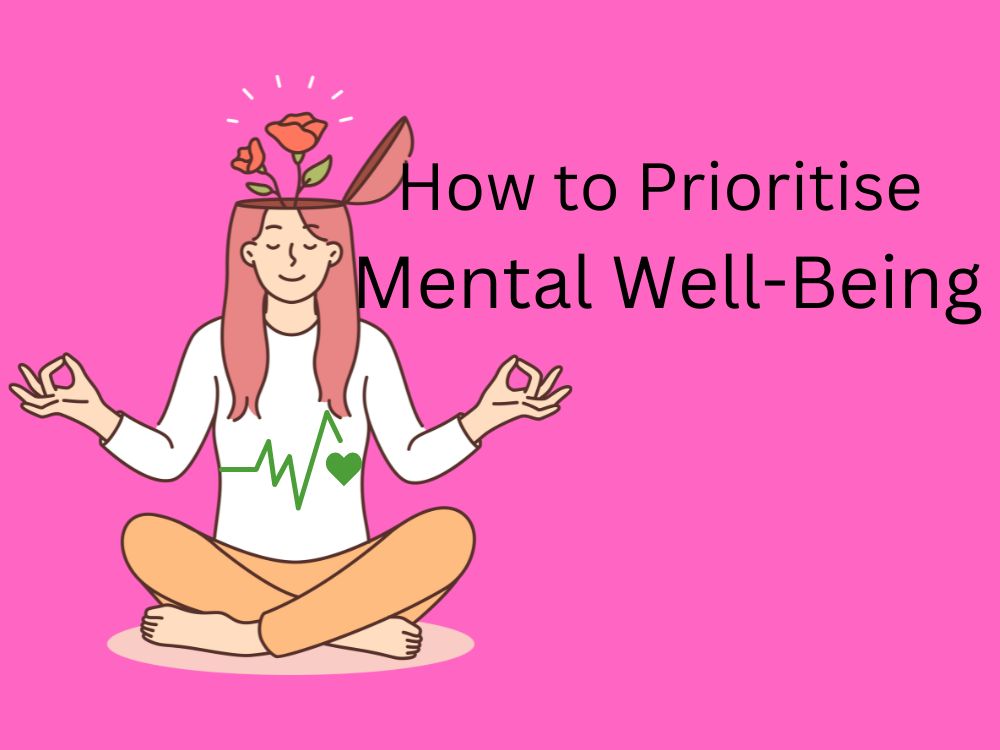Do you know someone in your family or close circle who might be struggling with their mental health? Maybe they’ve become distant, withdrawn, or overwhelmed by stress. Recognizing the signs early—like mood swings, isolation, or a sudden shift in behavior—can make all the difference. Understanding how to support someone struggling with mental health isn’t always easy, but small acts of kindness, patience, and genuine listening can help them feel less alone. In this guide on providing mental health support, we’ll explore thoughtful ways to help a loved one struggling with their mental well-being.
Why It’s Important to Support Someone Struggling with Mental Health
Supporting someone struggling with mental health isn’t just about offering kind words—it’s about being there in meaningful ways. Mental health challenges can feel isolating, and knowing that someone genuinely cares can make a world of difference. Whether it’s a friend, family member, or colleague, small gestures like listening without judgment, checking in regularly, or encouraging professional help can have a lasting impact. If you’re wondering how to support someone struggling with mental health, start by creating a safe space where they feel heard and valued. Your support could be the strength they need to heal.
Recent research underscores the critical role of social support in mental health recovery:
Social Support and Mental Health: A 2024 study published in Frontiers in Psychology found that perceived stress mediates the relationship between social support and mental health outcomes. Specifically, support from family and significant others was associated with reduced perceived stress, leading to increased positive affect and decreased anxiety and depression.
Helper Therapy Principle: The “helper therapy” principle suggests that providing assistance to others can enhance the helper’s own mental well-being. A systematic review highlighted that individuals who engage in helping behaviors experience personal growth, self-validation, and improved psychological health.
Here are some tips when it comes to helping someone with mental health problems.
1. Be an Active Listener
Active listening is a crucial part of providing mental health support. When someone is struggling, offering them a safe space to talk without judgment can make a significant difference. Instead of trying to fix their problems, focus on empathizing with their emotions. Acknowledge their feelings with open-ended questions and reassuring responses. Let them share at their own pace, ensuring they feel heard and supported.
✅ Do’s:
- Give them your full attention and maintain eye contact.
- Use validating phrases like “I hear you” or “That sounds really difficult.”
- Encourage open communication without pressuring them.
❌ Don’ts:
- Interrupt or offer immediate solutions unless they ask.
- Dismiss their struggles with phrases like “Just be positive” or “It’s not that bad.”
- Minimize their experiences or compare them to others.
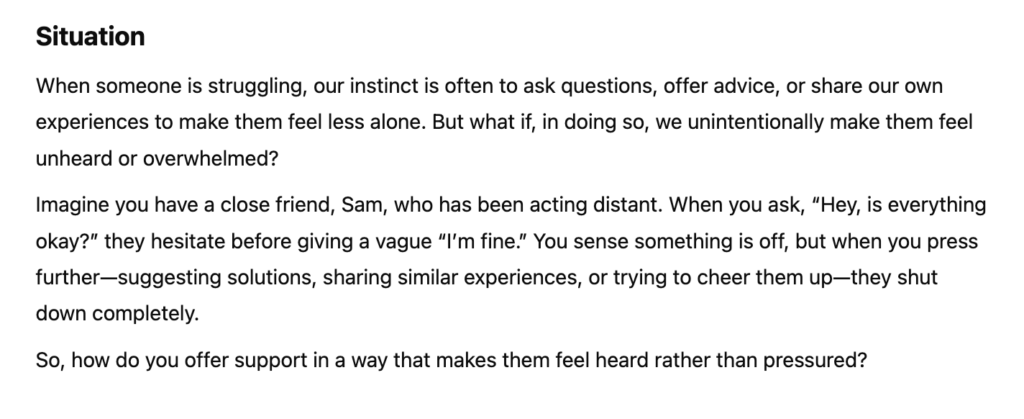
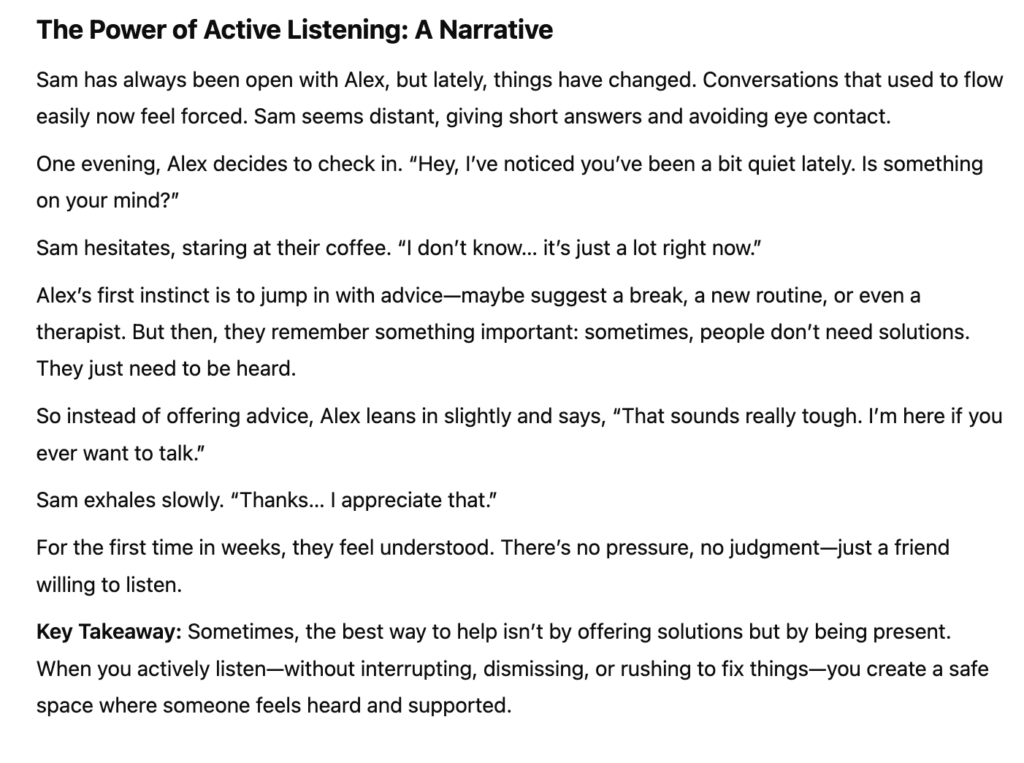
2. Offer Practical Support
Providing mental health support isn’t just about listening—it’s also about taking meaningful actions. Small gestures like helping with daily tasks, accompanying them to appointments, or simply checking in can ease their burden. Ask them directly what kind of support they need, as everyone’s struggles are different.
✅ Do’s:
- Offer specific help, like running errands or preparing meals.
- Respect their boundaries and provide support without being intrusive.
- Encourage them to seek professional help if needed.
❌ Don’ts:
- Assume you know what’s best for them without asking.
- Push them to do things they’re uncomfortable with.
- Make them feel guilty for needing support.

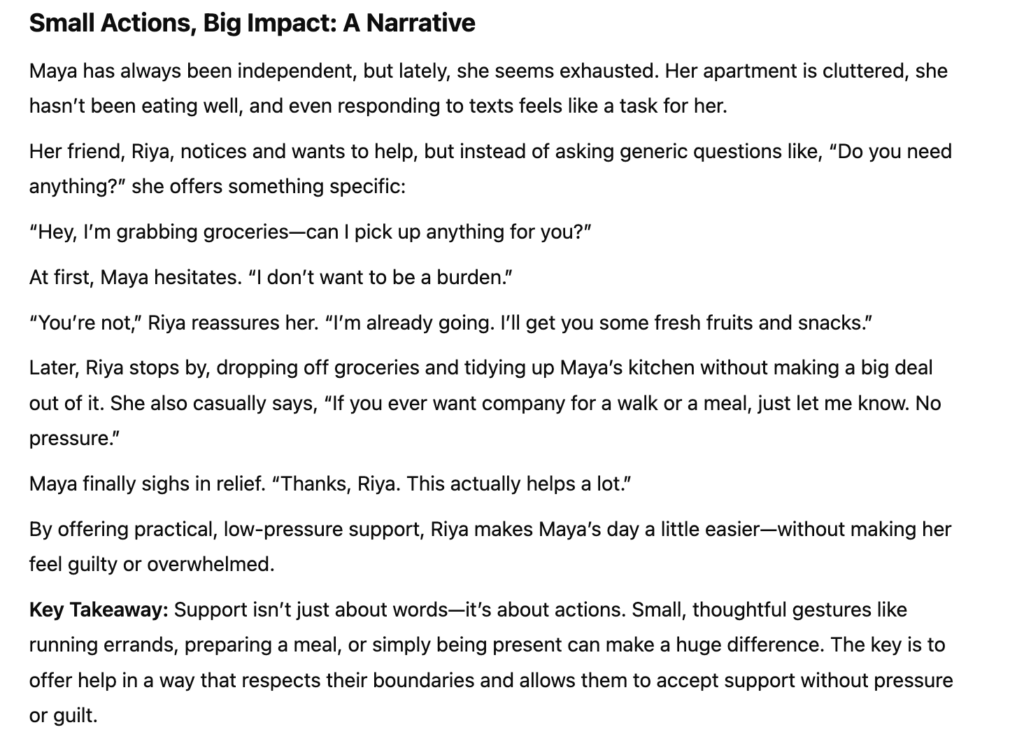
3. Encourage Open Communication
One of the most impactful ways to provide mental health support is by creating a safe space for honest conversations. Let them know they can talk without fear of judgment. Sometimes, just being there and actively listening can make a huge difference in their healing journey.
✅ Do’s:
- Listen without interrupting or offering unsolicited advice.
- Validate their feelings by acknowledging their struggles.
- Ask open-ended questions to encourage sharing.
❌ Don’ts:
- Minimize their feelings by saying things like “just stay positive.”
- Dismiss their emotions or compare their struggles to others.
- Force them to talk if they’re not ready.



4. Respect Their Boundaries and Personal Space
When someone is struggling with their mental health, they may not always have the energy to talk or engage. Some days, they might seek comfort in your presence, while other times, they just need space to process their emotions. It’s important to recognize that supporting someone doesn’t mean hovering over them or demanding constant updates. True support is about being there in a way that feels safe and reassuring, not overwhelming. Let them know you care, but also give them the freedom to reach out when they’re ready.
✅ Do’s:
- Let them open up at their own pace without feeling pressured.
- Check in occasionally, but respect their need for alone time.
- Reassure them that you’re there whenever they need support.
❌ Don’ts:
- Take their silence or withdrawal personally.
- Push them to talk or “get over it” quickly.
- Make them feel guilty for not responding right away.
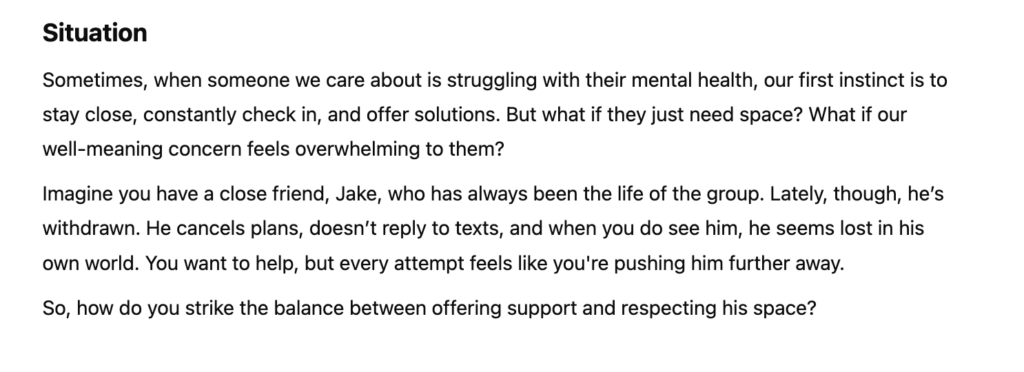
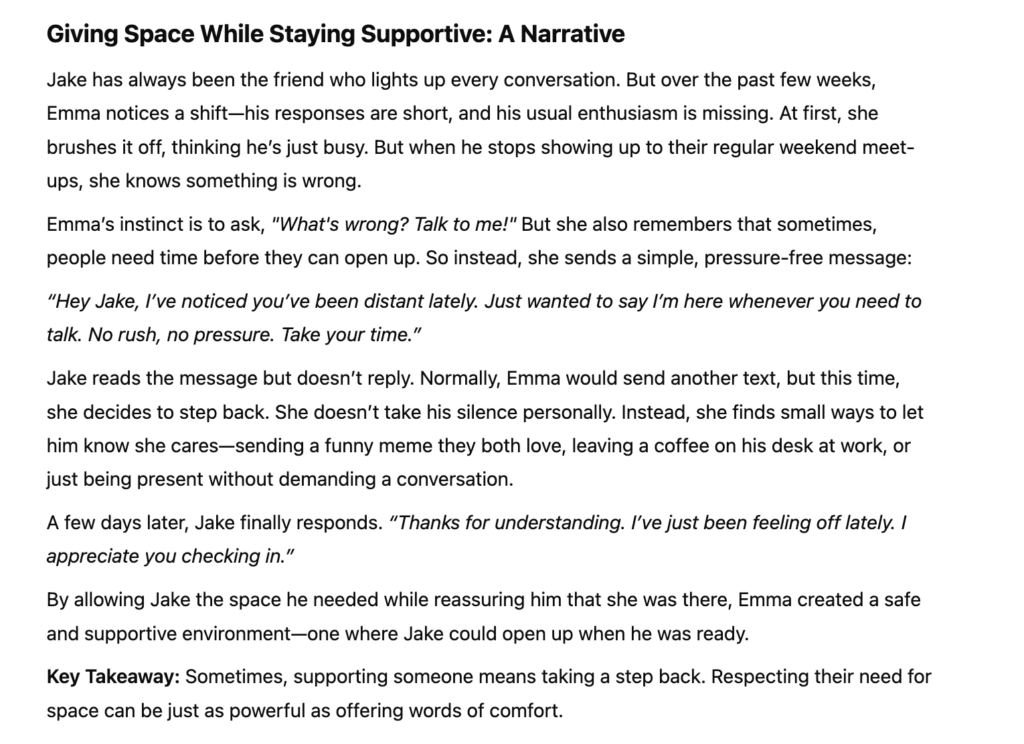
5. Avoid Playing Therapist: Support, Don’t Diagnose
With the internet flooded with mental health information, everyone thinks they’re a therapist. A quick search can pull up symptoms, conditions, and self-help guides, but easy access to information doesn’t mean we’re qualified to diagnose or give therapy. Mental health is complex, and misinterpreting someone’s struggles can do more harm than good. Instead of playing the role of a psychologist, focus on listening without judgment and encouraging professional help when needed.
✅ Do’s:
- Listen with empathy and validate their emotions.
- Encourage seeking help from a licensed therapist or counselor.
- Offer your support without assuming you have the answers.
❌ Don’ts:
- Tell them what condition they “might have” based on what you read online.
- Dismiss their feelings by comparing them to something you saw on social media.
- Offer unsolicited advice or alternative treatments without professional guidance.
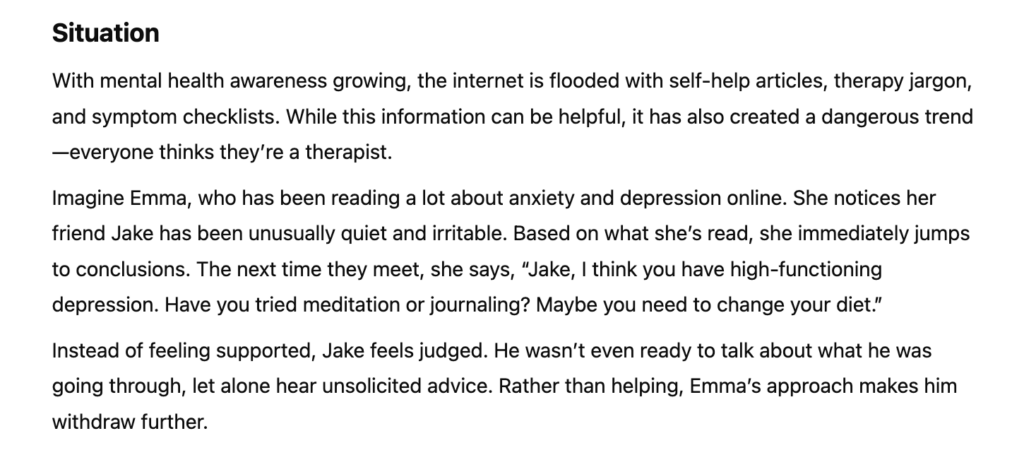
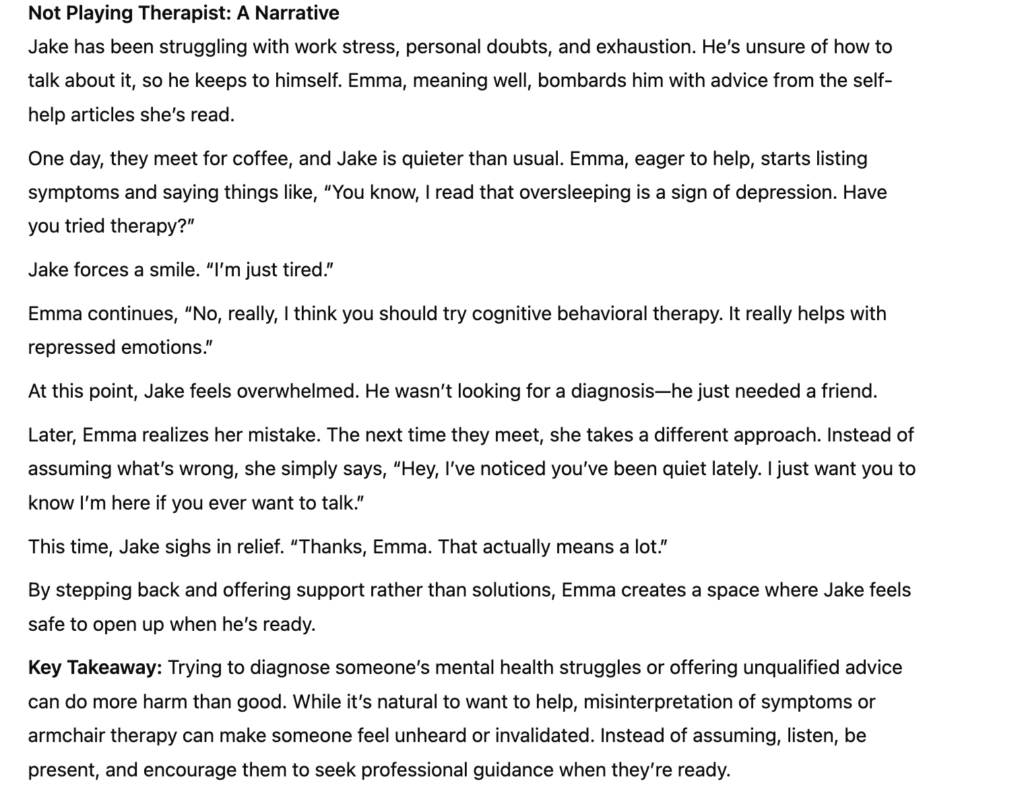
How to Offer Support During a Crisis
When someone is experiencing a crisis, their emotions can feel overwhelming, and they might struggle to process their thoughts clearly. In these moments, your response matters. The way you react can either provide comfort and reassurance or add to their distress.
It’s important to stay calm and composed. People in crisis often need someone to listen without judgment rather than offer immediate solutions. A simple acknowledgment of their feelings—such as “I’m here for you” or “You’re not alone in this”—can make a world of difference.
Encouraging them to seek professional help is also crucial. While friends and family can offer support, trained professionals are best equipped to guide them through their struggles. If the situation feels urgent, offering to help them find resources or even accompany them to seek assistance can be incredibly valuable.
At the same time, it’s essential to recognize your own limits. Supporting someone through a crisis doesn’t mean you have to carry their burden alone. If their safety is at risk, don’t hesitate to involve others who can help, whether it’s close family, a counselor, or even emergency services.
Ultimately, your role in a crisis isn’t to fix everything—it’s to be present, offer support, and encourage them to take the steps they need to heal.
How to Support Someone Who Refuses Help
It can be incredibly frustrating and heartbreaking when someone you care about is struggling but refuses help. You may feel helpless, worried, or even rejected. However, pushing too hard can sometimes backfire, making them withdraw further. So, how can you navigate this situation while still being a source of support?
One key approach is to respect their autonomy. People need to feel in control of their own decisions, especially when it comes to seeking help. Instead of insisting they get professional support, focus on creating a safe space where they feel comfortable opening up. Let them know you’re there without pressuring them.
It’s also important to be patient. Mental health struggles can make it difficult for someone to recognize that they need help. You might feel like you have all the answers, but they need to come to that realization on their own. Gently offering resources, sharing your own experiences, or even just being a consistent presence in their life can make a difference over time.
Lastly, set boundaries for yourself. While you want to help, you can’t force someone to change. Protecting your own mental well-being is just as important. Offer support, but don’t take on the responsibility of “fixing” them.
Frequently Asked Questions on How to Support Someone Struggling With Mental Health
How should I respond if someone’s beliefs seem unusual or alarming?
When someone expresses beliefs that seem unusual or alarming, it’s important to approach the situation with empathy and care rather than immediate judgment or dismissal.
First, try to understand their perspective by listening without interrupting. What may seem irrational to you might feel very real to them. Avoid arguing or trying to “correct” their beliefs, as this can create resistance or make them feel misunderstood. Instead, validate their emotions by saying things like, “That sounds really difficult. I’m here for you.”
If their beliefs are causing them distress or putting them or others in danger, gently encourage them to seek professional help. You might say, “I care about you, and I think talking to someone who can help might make things easier.” If the situation feels urgent, involving a trusted family member, friend, or a mental health professional may be necessary.
Ultimately, the goal isn’t to challenge or debate their perspective but to offer support in a way that ensures their well-being and safety.
What can I do if it’s a mental health emergency?
In a crisis situation, staying calm and acting quickly can make all the difference. If someone is in immediate danger—such as expressing suicidal thoughts, self-harming, or experiencing a severe mental health episode—take their words and actions seriously.
Steps to Take:
- Ensure Immediate Safety: If they are in danger of harming themselves or others, don’t leave them alone. Remove any harmful objects if possible.
- Call for Professional Help: Contact emergency services or a crisis helpline. If they are willing, help them reach out to a mental health professional.
- Stay Calm and Reassuring: Speak in a gentle, non-judgmental tone. Avoid panic, as this can escalate the situation. Let them know you’re there for them.
- Encourage Professional Support: If the situation isn’t immediately life-threatening but still serious, guide them toward professional help as soon as possible.
- Follow Up: After the crisis has passed, check in on them. Let them know they’re not alone and that you’re there to support them through their healing process.
Emergencies require immediate action, but your support doesn’t end there. Ensuring they receive ongoing help and care is just as important.
How can I provide meaningful emotional support?
Providing meaningful emotional support means being present, empathetic, and non-judgmental. Often, people struggling with their mental health don’t need immediate solutions—they just need to feel heard and understood.
Here’s how you can offer support effectively:
- Listen actively – Give them your full attention, maintain eye contact, and acknowledge their feelings with validating responses like “That sounds really tough” or “I’m here for you.”
- Avoid judgment – Refrain from minimizing their emotions or offering unsolicited advice. Statements like “It could be worse” or “Just cheer up” can feel dismissive.
- Be patient – Everyone processes emotions differently. Give them space to open up at their own pace without pressuring them to talk.
- Offer reassurance – Let them know they’re not alone and that their feelings are valid. Sometimes, a simple “I’m here for you” can make a huge difference.
- Encourage professional help – If they’re struggling significantly, gently suggest speaking to a therapist or counselor while reassuring them that seeking help is a sign of strength, not weakness.
Above all, emotional support is about being a safe and comforting presence. It’s not about fixing their problems but walking alongside them as they navigate their struggles.
How to live with a person with mental illness?
Living with a person who has a mental illness requires patience, understanding, and a supportive approach. It’s important to balance offering help while also taking care of your own well-being.
Ways to Support Them Effectively:
- Educate Yourself – Learn about their condition to understand what they’re going through. This helps you respond with empathy rather than frustration.
- Communicate Openly – Encourage honest conversations without forcing them to talk. Validate their feelings and listen without judgment.
- Respect Their Boundaries – Give them space when needed, and don’t take it personally if they withdraw. Let them set the pace for interactions.
- Encourage Professional Help – Support them in seeking therapy or medication if needed, but don’t try to replace professional guidance with personal advice.
- Help with Daily Tasks – Sometimes, basic responsibilities can feel overwhelming. Offer practical help, like cooking, cleaning, or organizing their schedule, without making them feel incapable.
- Create a Safe and Stable Environment – A calm, predictable home life can help reduce stress. Avoid unnecessary conflicts and encourage a healthy routine.
- Take Care of Yourself Too – Supporting someone with mental illness can be emotionally draining. Set boundaries, seek support from friends or therapists, and take breaks when needed.
What Not to Do:
- Don’t try to “fix” them – Mental illness isn’t something you can solve overnight. Offer support, not solutions.
- Avoid making them feel guilty – Saying things like “You’re bringing everyone down” or “Just get over it” can worsen their condition.
- Don’t neglect your own needs – You can’t support someone else effectively if you’re exhausted or overwhelmed.
Living with someone who has a mental illness can be challenging, but with compassion and the right approach, you can foster a healthier and more supportive relationship for both of you.
How can I recognize if someone is struggling with their mental health?
Recognizing mental health struggles involves observing changes in behavior, mood, and daily habits. Signs can include withdrawal from social interactions, mood swings, lack of energy, sleep disturbances, loss of interest in activities, increased irritability, and expressions of hopelessness. Physical symptoms like frequent headaches or stomach issues can also be indicators. If someone seems “off” for an extended period, it may be a sign they’re struggling.
What should I avoid saying to someone who is struggling?
Words matter, and saying the wrong thing can make someone feel dismissed or invalidated. Avoid phrases like:
❌ “Just think positive.” – This can feel dismissive.
❌ “Others have it worse.” – Comparisons don’t help.
❌ “You’re overreacting.” – Their feelings are valid.
❌ “Snap out of it.” – Mental health struggles aren’t a choice.
Instead, offer validation and understanding:
✅ “I’m here for you.”
✅ “That sounds really difficult.”
✅ “You’re not alone in this.”
How can I encourage someone to seek professional help?
Encouraging someone to seek help requires patience and sensitivity. Instead of forcing the idea, gently express concern:
“I’ve noticed you’ve been struggling, and I care about you. Have you thought about talking to someone who can help?”
Offer to assist in finding a therapist or accompanying them to an appointment.
Normalize therapy by sharing positive stories or experiences.
If they’re hesitant, let them know seeking help isn’t a sign of weakness but of strength.
What should I do if I feel overwhelmed while supporting someone?
Supporting someone can be emotionally draining, so it’s important to set boundaries and care for yourself, too.
- Recognize your limits—it’s okay to say, “I want to help, but I also need to take care of myself.”
- Encourage them to seek additional support from professionals or others in their life.
- Take breaks when needed—burnout doesn’t help either of you.
- Engage in self-care activities that recharge you.
Helping others is important, but you can’t pour from an empty cup.
How can I help someone who is isolating themselves?
When someone isolates themselves, they may feel unworthy of support or emotionally drained. Instead of forcing social interaction, try gentle approaches:
- Send check-in messages without pressure: “Thinking of you. No rush to reply, just here if you need me.”
- Offer low-pressure activities: a walk, watching a movie, or sitting together in silence.
- Reassure them that you care without demanding explanations.
The goal is to create a safe, non-judgmental space where they feel supported without feeling forced.
What are some signs that immediate intervention is needed?
If someone is in immediate distress or danger, intervention is crucial. Watch for these warning signs:
🚨 Expressing thoughts of self-harm or suicide.
🚨 Giving away possessions or saying goodbye in a final way.
🚨 Extreme mood swings, impulsive behavior, or hallucinations.
🚨 Talking about feeling hopeless, trapped, or like a burden.
If you notice these, don’t hesitate to act.
- Encourage them to seek emergency support or call a crisis helpline.
- If there’s an immediate danger, seek professional help or emergency services.
Being proactive could save a life.

